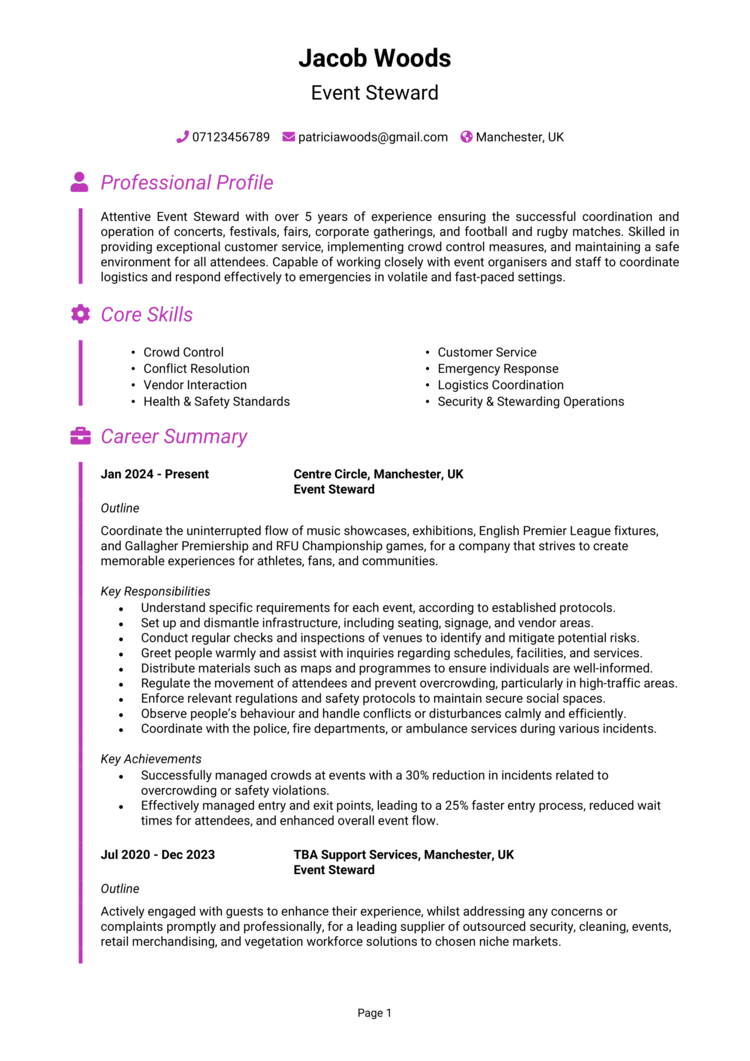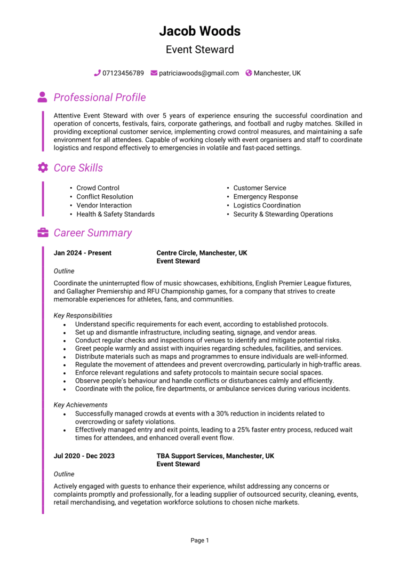From safety checks to helping guests find their seats – you’ve got the kind of on-the-ground skills that keep events running smoothly.
But to land your next role, you’ll need more than just a friendly smile and a hi-vis vest; you’ll need a CV that shows you can handle responsibility and deliver under pressure.
This guide and its Event Steward CV example will take you through how to highlight your reliability, people skills, and ability to keep large gatherings safe and organised, so you stand out to recruiters in a busy field.
Event Steward CV sample

How to write your Event Steward CV
Discover how to craft a winning Event Steward CV that lands interviews with this simple step-by-step guide.
Being an Event Steward is all about visibility – not just on the venue floor, but in the hiring process too. A well-structured, tailored CV ensures your experience stands out instantly, no matter what event you’re hoping to help run.
In the next sections, you’ll see how to write a CV to present your most relevant experience and frame your skills so that employers can quickly see you’re the safe pair of hands they need.
What’s the right way to structure and format your Event Steward CV?


At busy events, everyone needs to know exactly where to go and when – and your CV should work the same way for recruiters. A clear structure ensures they can instantly locate your qualifications, experience, and skills without getting lost in a tangle of information. Present it logically, with your most important details easy to find at a glance.
Here’s the layout to follow:
- Name and contact details – Display your personal details clearly at the top so employers can get in touch easily. Including a photo is entirely optional.
- Profile – Begin with a concise summary that highlights your expertise and what you bring to the role.
- Core skills – Highlight your strongest skills that align with the role’s requirements.
- Work experience – Start with your most recent role and work backwards, showcasing achievements and responsibilities.
- Education – Mention your degrees, certifications, and any training that supports your career path.
- Additional info – Include any additional details, like awards, professional memberships, or hobbies that highlight your skills or personality.
When formatting, make it clean and simple: use bullet points for clarity, a professional and easy-to-read font, and clear section headings so your CV is effortless to scan. Keep the length to two pages so that every detail earns its place, and use white space strategically to make the document look neat and approachable.
How to create an Event Steward CV profile


The CV profile is your first opportunity to tell the recruiter what makes you the right steward for the job. It should be a short, impactful summary that shows you understand the role’s responsibilities and can deliver them with skill. Beyond listing your background, focus on the value you bring – whether that’s ensuring events run smoothly and safely, or providing excellent customer service.
Event Steward CV profile examples
Profile 1
Experienced Event Steward with over 10 years of experience supporting large-scale concerts, sports fixtures, and festivals. Skilled in managing crowd control, ticket verification, and emergency response procedures to ensure attendee safety. Familiar with radio communication systems and incident reporting, with a strong reputation for professionalism and reliability under pressure.
Profile 2
Reliable Event Steward with six years of experience working at stadiums, exhibitions, and community events. Adept at greeting guests, checking passes, and directing attendees to designated areas. Trained in conflict resolution and first aid, with proven ability to maintain a calm and approachable presence in high-traffic environments.
Profile 3
Dedicated Event Steward with three years of experience in theatre and cultural events, assisting with front-of-house operations and audience management. Skilled in customer service, providing assistance to visitors, and ensuring compliance with venue regulations. Known for strong communication skills and a proactive approach to maintaining safety and comfort for all guests.
Details to put in your Event Steward CV profile
Here are some tips on what to include in your profile:
- Where you worked – Briefly mention the types of events and venues you’ve worked at, such as stadiums, festivals, or conferences.
- Your top qualifications – Include any safety, security, or customer service training that boosts your credibility.
- Essential skills – Explain the core capabilities you bring to the role, from crowd management to emergency response.
- The environments you’ve worked in – Show adaptability by noting different event sizes and formats you’ve handled.
- Value delivered – Highlight how your presence and actions have helped maintain safety, efficiency, and a positive experience for attendees.
Presenting your core skills


A core CV skills section helps employers instantly see that you have the right strengths for the job. This is your chance to emphasise hard, tangible skills that match what’s in the job description – the kind recruiters will scan for first.
Avoid vague claims and focus on the practical capabilities that make you a strong steward. Tailoring this section to each application ensures you’re showing the most relevant skills for that specific event or employer.
Essential skills that recruiters look for in an Event Steward CV
- Crowd Monitoring and Control – Managing crowd flow and ensuring public safety by guiding attendees and preventing congestion in busy areas.
- Entry and Exit Management – Checking tickets or passes, directing guests to the correct entrances, and maintaining orderly entry procedures.
- Emergency Response Support – Assisting with evacuation procedures, first aid situations, or incident reporting as per event safety protocols.
- Customer Assistance and Wayfinding – Providing directions, answering questions, and helping attendees locate facilities and services.
- Queue Management – Organising and controlling lines at entrances, concessions, or restrooms to minimise wait times and maintain order.
- Venue Set-Up and Preparation – Assisting with the arrangement of signage, barriers, and crowd control equipment before the event begins.
- Compliance with Health and Safety Regulations – Following all safety guidelines and ensuring attendees adhere to event rules and policies.
- Communication via Radio or Team Channels – Coordinating with other stewards and security staff to report issues or relay updates quickly.
- Lost Property and Missing Persons Support – Handling lost-and-found enquiries and assisting with missing persons procedures.
- Post-Event Duties – Supporting clean-up efforts and helping with crowd dispersal at the end of the event.
How to highlight work experience


This is where you show how you’ve applied your skills in real-life scenarios. Employers want to see proof that you can handle the fast-paced and unpredictable nature of live events, and your work experience section should accomplish that.
Walk through your roles in reverse chronological order, starting with your most recent. Include both paid and voluntary stewarding experience if relevant. For each role, open with a short summary of the event or venue and your position, then follow with bullet points that outline your main responsibilities and key successes.
How to make your past experience easy to read for employers

- Outline – Provide an overview of the event or venue, your role, and the main purpose of your position. Include who you reported to or worked alongside.
- Responsibilities – Use action words like “monitored” and “assisted.” For example: “monitored crowd flow to prevent bottlenecks” or “assisted attendees with directions and seating.”
- Achievements – Give evidence of the positive impact you made, such as handling a large number of attendees without incident or receiving commendations for service.
Example job entries for Event Stewards
Event Steward | Ashcroft Stadium Services
Outline
Provided crowd management and safety support at a major football stadium hosting national and international fixtures. Worked as part of a large stewarding team to maintain order and assist spectators.
Responsibilities
- Checked tickets and guided attendees to correct seating areas
- Monitored crowd movement and reported potential risks via radio communication
- Assisted disabled and elderly visitors with access and seating
- Responded to spectator queries and provided information on facilities
- Supported emergency evacuation procedures during safety drills
Achievements
- Maintained 100% compliance with safety protocols across all assigned matches
- Praised by supervisors for calm handling of high-pressure crowd situations
- Assisted in reducing spectator complaints by 20% through proactive customer care
Event Steward | Marlowe Events & Exhibitions
Outline
Worked at large exhibition centres and conference venues, ensuring smooth entry and safety of thousands of delegates and visitors daily. Focused on customer service and security responsibilities during live events.
Responsibilities
- Verified tickets and passes at entry points and provided visitor wristbands
- Directed attendees to appropriate halls, stands, and facilities
- Monitored exhibition floor for potential hazards and responded to incidents
- Provided information and assistance to exhibitors and guests
- Coordinated with security staff to escalate concerns when required
Achievements
- Contributed to successful delivery of events with 10,000+ daily visitors
- Recognised for excellent customer service in delegate feedback surveys
- Reduced queue waiting times by 15% through proactive crowd flow management
Event Steward | Greenfield Arts Centre
Outline
Supported cultural and theatre events at a regional arts centre, working closely with front-of-house teams to ensure audience safety and comfort. Assisted with both small community shows and larger touring productions.
Responsibilities
- Welcomed guests and checked tickets at theatre entrances
- Escorted audience members to seats and managed late entry procedures
- Monitored auditorium during performances to enforce safety and etiquette rules
- Provided support for disabled patrons and families with young children
- Completed incident and accident reports when necessary
Achievements
- Helped maintain a 4.8-star customer service rating for the venue
- Awarded Employee of the Month for exceptional service during a sold-out event run
- Supported smooth delivery of over 100 performances annually without safety incidents
Education and qualifications


Event Steward roles often focus more on experience than formal education, but your academic background still has its place. Include any relevant training such as first aid, safety, or customer service qualifications. If you have further study in areas like security or hospitality, note it here.
List qualifications in reverse chronological order, starting with the most recent. Keep it concise, but make sure to mention any certifications that directly relate to stewarding or event safety.
Qualifications recruiters look for in an Event Steward
- Level 2 Award in Understanding Stewarding at Spectator Events – Recognised by employers for safety and crowd control knowledge.
- First Aid at Work Certificate – Shows readiness to respond in emergencies.
- SIA Door Supervisor Licence – Useful for roles with a greater security focus.
- Customer Service Training Certification – Demonstrates skills in assisting attendees and handling enquiries.
- Level 2 Award in Conflict Management – Prepares you for resolving disputes calmly and effectively.





